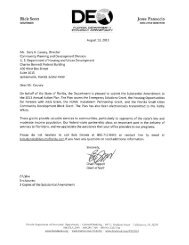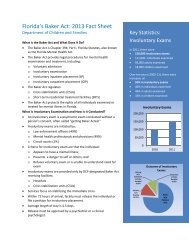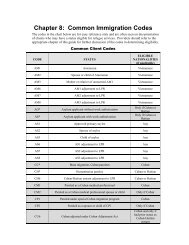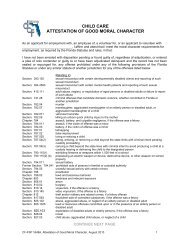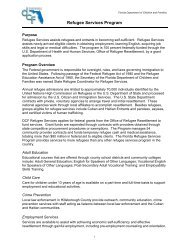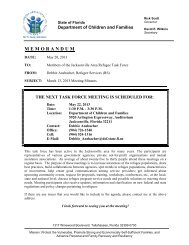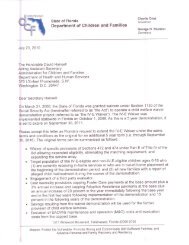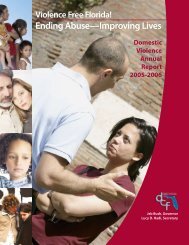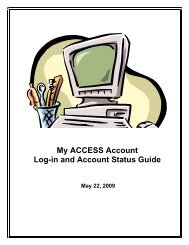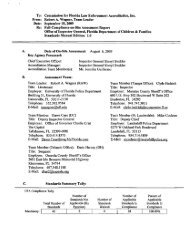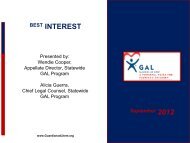The National Strategy for Child Exploitation Prevention and Interdiction
The National Strategy for Child Exploitation Prevention and Interdiction
The National Strategy for Child Exploitation Prevention and Interdiction
You also want an ePaper? Increase the reach of your titles
YUMPU automatically turns print PDFs into web optimized ePapers that Google loves.
conducted between September 1999 <strong>and</strong> February 2000. <strong>The</strong> Crimes Against <strong>Child</strong>ren ResearchCenter at the University of New Hampshire designed the survey to study youth exposure tosexual content, solicitation, <strong>and</strong> harassment on the Internet. Researchers conducted telephoneinterviews with a nationally representative sample of 1,500 youth Internet users between the agesof 10 <strong>and</strong> 17.Analyzing the results of the survey, the authors of this article attempted to determine whetheronline bullies differ from traditional, offline bullies. <strong>The</strong> study found differences <strong>and</strong> similaritiesbetween offline <strong>and</strong> online aggressors. Although boys commit most incidents of offlineharassment, the number of boys <strong>and</strong> girls who use the Internet to harass their peers is almostequal. Both offline bullies <strong>and</strong> youth who harass others online often have multiple psychosocialissues: 51 percent of all bullies had been victims of traditional bullying, 44 percent had a poorrelationship with their caregiver, 37 percent showed a pattern of delinquency, <strong>and</strong> 32 percentwere frequent substance abusers. <strong>The</strong> authors suggest that mental-health practitioners, healthcareproviders, <strong>and</strong> educators need to address the mental health issues of those who use theInternet to harass others, as well as the mental health issues of those who are victims of onlineharassment.Roban, Whitney. “<strong>The</strong> Net Effect: Girls <strong>and</strong> New Media.” Executive Summary, Girl ScoutResearch Institute, Girl Scouts of the United States of America, New York, 2002.http://www.girlscouts.org/research/pdf/net_effect.pdf (accessed March 20, 2009).This article, reporting a 2001 study of 1,246 girls, examines how parents can help their 13- to 18year-old daughters use the Internet safely. Unlike other studies on the topic of adolescent Internetuse, this study focused on teenage girls only <strong>and</strong> used a variety of methodologies, includingsmall-group interviews, journals, written surveys, <strong>and</strong> an online survey. <strong>The</strong> study revealed that,although girls in this age-group know a lot about computers <strong>and</strong> the Internet, they still need <strong>and</strong>desire adult guidance. Fifty-eight percent of the girls reported that they themselves were the mostcomputer-savvy person in their households. This finding indicates that, more than likely, not allgirls are receiving pertinent Internet-safety in<strong>for</strong>mation from their parents. Most girls said thatthey use their common sense to behave safely on the Internet. A majority of the girls—75percent—said that their parents had set Internet rules <strong>for</strong> them, but 57 percent reported that theyhad broken those rules. <strong>The</strong> girls reported that parental rules included time limits on Internet use<strong>and</strong> prohibitions against online chatting, online shopping, <strong>and</strong> online romances or face-to-facemeetings. Girls had also received prohibitive directives from their parents, such as “Don’t giveout personal in<strong>for</strong>mation.” However, the study suggests that girls need proactive advice as well.<strong>The</strong> girls reported their perception that their parents are concerned about the wrong things, suchas the type of in<strong>for</strong>mation the girls can access online, the kind of people they might contact, <strong>and</strong>their online behavior. <strong>The</strong> girls expressed their desire <strong>for</strong> their parents to teach themresponsibility, to educate them about possible dangers, <strong>and</strong> to trust them to use the Internetsafely.<strong>The</strong> study concluded that parents should try to be more proactive in their relationship with theirdaughters. By attempting to underst<strong>and</strong> their daughters’ online lives <strong>and</strong> by developing trustingrelationships with them, parents can learn to communicate better with their daughters <strong>and</strong> helpthem navigate positive <strong>and</strong> negative Internet experiences.F-27



